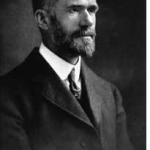Review of Vern Sheridan Poythress, Redeeming Sociology: A God-Centered Approach, by Bradley Wright, an associate professor of sociology at the University of Connecticut and author of the award-winning Christians Are Hate-Filled Hypocrites…and Other Lies You’ve Been Told: A Sociologist Shatters Myths From the Secular and Christian Media and his newest book, just released, Upside: Surprising Good News About the State of Our World.
 When I was in graduate school, one of the faculty members had the coolest postcard on his door. It showed a 1950s-style young couple, in a convertible, stopped at a fork in the road. In front of them was a sign, and to right it pointed “Sociology” and to the left it pointed “God”. Next to the sign was Jesus, with his arm raised, guiding the couple to the left.
When I was in graduate school, one of the faculty members had the coolest postcard on his door. It showed a 1950s-style young couple, in a convertible, stopped at a fork in the road. In front of them was a sign, and to right it pointed “Sociology” and to the left it pointed “God”. Next to the sign was Jesus, with his arm raised, guiding the couple to the left.
This postcard illustrates the tension I feel between my Christian faith and my sociological profession. Are they entirely separate enterprises? Do they contradict each other? Does either shed light on the other?
It was in this context that I was rather pleased to receive a book from Scot, Redeeming Sociology: A God-Centered Approach, by Vern Sheridan Poythress.
Professor Poythress has a collection of degrees in mathematics, linguistics, and theology, from the very best universities, and from his writing it’s clear that he’s really, really smart. In this book, he uses philosophy and theology to develop a biblical view of the importance of relationships. In doing so, he demonstrates that the Bible presents God as involved in relationships at every level. God, himself, is in relationship in the trinity. God makes covenants, a form of relationships, with humans. God rules humans. Humans react to God in a cultural context. God recognizes many differences in human beings. These are some of the many ways that Poythress elaborates the many roles of God in human relationships.
I’ve come away from reading the book with a greater appreciation for the relational character of God, that he both embodies and embroils himself in human relationships at every level of society.
If I were dissatisfied with this book, besides the fact that Poythress only has 6 degrees (come on, you call that an education), it’s that I still have an itch to learn more about the integration between a God-centered world view and sociology. Poythress develops the former, but it remains relatively separate from the latter. There’s actually very little sociology in the book, except for a couple of interesting appendices.
For example, is sociology incompatible or complimentary with Christianity? Sociologists speak of taking a stained-glass window approach to religions, meaning that since we like to deal with what can be observed, we look at religions from the outside—neither accepting nor rejecting the assumptions of any given religion, rather simply examining what we can see. Or, how about the reverse, is Christianity incompatible with sociology?
Another way of framing the question is one of contribution. Are there aspects of sociology that can contribute to the understanding and advancement of Christianity? If so, what are they? Likewise, are there aspects of Christianity that can contribute to sociology? Poythress doesn’t develop the possible coming together of theology and sociology. Let me give you an example.
Poythress cites an introductory sociology textbook (which appears to be his main reference for sociology) as describing sociology as a discipline that looks for general principles in specific situations. For example (quoting from the textbook quoted by Poythress):
A sociological study “found that higher income women typically expected the men they married to be sensitive to others, to talk readily, and to share feelings and experiences. Lower-income women… had very different expectations and were looking for men who did not drink too much, were not violent, and held steady jobs.”
Poythress counters that “such generalizations are not unique to modern sociology. The book of Proverbs is full of such generalizations, such as “the vexation of a fool is known at once, but the prudent ignores an insult (Proverbs 12:16).”
Does Poythress mean that given the Bible’s generalization, there’s no need for sociology or that sociology is wrong? Or, is he making the point that sociology is not the only thought system that generalizes? (Something that I think most sociologists would readily agree to).
At various times, I wondered how familiar Poythress is with the study of sociology. For example, in his section on scientific sociology, he brings up the “challenge of spurious correlation.” Here, he makes the point that a correlation between any two factors can indicate that changes in one might “cause” changes in the other. Or, they may simply reflect spurious correlation. He writes “statistical correlations may suggest an underlying causal relationship. But it seems that they can never establish it. We cannot succeed in eliminating the possibility that other, deeper factors might be the actual causes.” This idea, that correlation doesn’t necessarily mean causation, is a basic principle of social research, one which we teach in the first few lectures of any undergraduate class on sociological methods.
As such, this book is perhaps less about redeeming sociology than it is developing a systematic theology of God and social relationships. This makes sense, given Poythress being a New Testament scholar, but it leaves a sociologist wanting more. Given Poythress’ obvious intelligence and learning, I would like to seat him in a good introductory sociology class for a semester, and at the end, ask him how should sociology be done differently in light of Christianity, and, how should Christianity be done differently in light of sociology?















